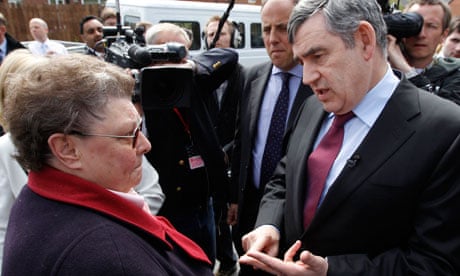I've just spent half an hour on the phone to various Labour party people, and here is the not-exactly-revelatory upshot: "bigotgate" – if you want to call it that – is beyond grim. Even if the prospect of David Cameron fighting the corner of once-loyal working-class Labour voters sounds absurd, that's what will surely define tomorrow night's debate: egged on by tomorrow morning's headlines (and get ready for a real peach from the Sun), the moneyed Old Etonian carpeting the son of the manse for his failure to understand the concerns of ordinary folk. Note also the part of the story that plays to Brown's alleged bullying side: his attempt to blame the incident on some hapless member of his own staff.
The incident perfectly captures a plotline that I've observed time and again, not least as we've been travelling around the country during the campaign: millions of people who are confused, unsettled, and often ragingly angry, faced with a political class that affects to feel their pain, but too often holds them in borderline contempt. What with the rise in support for the BNP – and that great chasm that divides too much of the country from richer corners of the capital – the metropolitan media is part of the same problem. It tends to portray them as latter-day Alf Garnetts, nostalgic for a world long gone, and fired up by the kind of prejudices that have no place in London W1 or W11.
In fact, as Gillian Duffy proves, their concerns are a mixture of right and left-ish stuff, much of it traceable to the fact that as Britain has gone through convulsive change after convulsive change, nobody in power has ever bothered giving them much of an explanation. They base their ire on neighbourhoods that have been radically altered, a state that often seems to operate according to its own distant logic, and the absence of the kind of collectivist politics they feel Labour has left behind as it chases the votes of people in supposedly affluent marginals.
Of late, I've talked to them time and again. In South Shields: the builder whose hourly rate had come down by £3 an hour once the construction trade turned to recently arrived Poles. In Blackpool: Delwyn and Sylvia, who stuck to a Daily Mail-esque line on crime and immigration, but fretted about how people manage to live on the minimum wage.
Duffy, let's not forget, lives in Rochdale, another place far from the Middle English milieu at which so much of our politics is aimed. She doesn't understand why her pension is taxed, and says she isn't eligible for pension credits, but also thinks the welfare state is a soft touch. She wonders where "all these eastern Europeans" are coming from. And she laments the demise of student grants, and the fate of her grandchildren: "What will they have to pay to get into university?" There are millions of people like this: without their support, to put it bluntly, Labour is screwed.
In outer London, and Lancashire, and Stoke, the BNP will make hay with all this (remember how Jean-Marie Le Pen built up support for the French National Front by pitting himself against the distant Parisian elite). Even if they lack the kind of Norman Tebbit-esque voice that could have seized on all this in an instant, the Tories will big up the hardline, Eurosceptic, anti-welfare aspect of their DNA, and presumably draw away some crucial Labour votes. Ukip will be ecstatic; the knuckles-down-a-blackboard voices of Littlejohn et al will not let up for weeks. In so assisting the forces of rightwing populism, it could even decisively do for the Lib Dem surge.
And somewhere within Labour's collective psyche, there will a creeping awareness of how they arguably ended up here: by mortgaging their future on a mixture of contorted electoral arithmetic, and secondhand free-marketry, and so forgetting their own people that their own prime minister met an pretty average Labour voter, heard her concerns, and came away seething. (It's worth bearing in mind a phrase beloved of market traders in the West Midlands: "Never make a mug of your punter.")
This may sound tangential, but I'm rather reminded of a passage from a Tony Blair conference speech that both set out New Labour's credo, and captured its essential pathology. "The character of this changing world is indifferent to tradition," he said. "Unforgiving of frailty. No respecter of past reputations. It has no custom and practice. It is replete with opportunities, but they only go to those swift to adapt, slow to complain, open, willing and able to change." That doesn't describe Gillian Duffy, nor millions and millions of other people. And in this awful episode, here are the wages of that ever-festering disconnection.






